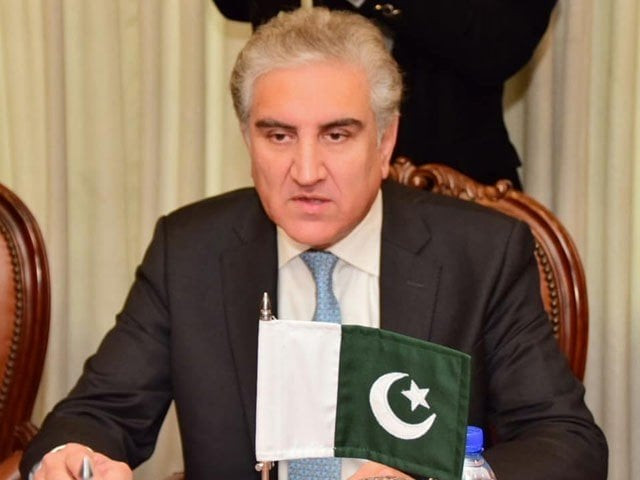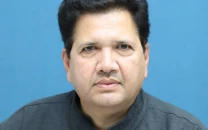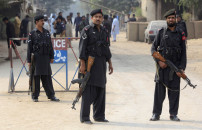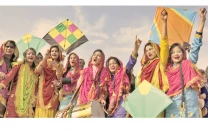World urged to adopt Pakistan’s roadmap to resolve Kashmir issue
FM Qureshi says in an Asian century, we will have to rely on traditional Asian wisdom to illuminate the way forward

Foreign Minister Shah Mahmood Qureshi has warned that the effectiveness of the post-World War II international structures is eroding and states will have to rely on their own strengths and take bold steps to rectify historic mistakes.
He made the remarks while addressing an international webinar hosted by Islamabad Policy Institute on ‘Annexation of Occupied Jammu and Kashmir by India: Lessons for regional security’ on Monday. Participants of the virtual session were from Indian Illegally Occupied Jammu and Kashmir (IIOJK), China, Turkey, Iran, Bangladesh and Nepal, in addition to local think tanks and scholars.
“This world is more uncertain, less predictable, and for these reasons, perhaps more dysfunctional. The buffers and support systems of international organisations and international law, that helped buttress the post-Second World War growth and prosperity may no longer deliver desired outcomes,” Qureshi said.
“States will increasingly be left to fall back upon their own devices and bank upon their own strengths. While challenges will persist, there are now opportunities and the necessary political space to take bold steps to correct past mistakes," he added.
“In an Asian century, we will have to rely on the traditional Asian wisdom, to illuminate the way forward,” the foreign minister said urging the world to take a leaf from Pakistan’s four-point roadmap for dealing with India on Kashmir issue.
The roadmap, he said, includes confronting, exposing and pushing back against India by deterring its expansionist designs and adapting to allow regional integration from being held hostage by India.
Referring to IIOJK, Human Rights Minister Shireen Mazari said annexation of an internationally recognised disputed territory and making attempt to change its demography amount to war crimes.
She warned the international community against the dangerous implications of pursuing a policy of appeasement towards Indian Prime Minister Narendra Modi and compared it with the British appeasement of Hitler’s regime.
She proposed several steps for strengthening Pakistan’s Kashmir diplomacy, which included greater emphasis on lawfare, highlighting crimes against women and children, greater appeal to international women NGOs, and seeking establishment of an independent commission to probe the human rights violations in IIOJK.
Mazari advocated exploring the possibility of Kashmiris raising their humanitarian concerns at the International Criminal Court.
She further suggested taking a fresh look at the ‘Good Friday Agreement’ as a possible model for conflict resolution and promoting Kashmiri culture of resistance.
Prof Ye Hailin, Director China Academy of Social Sciences (CASS), questioned the contemporary relevance of the 1906 Beijing Treaty between Qing dynasty and the British Empire in 1906 regarding the demarcation of the borders.
He expressed deep concern regarding the Indian mindset and ideology and its behaviour towards other states.
Ambassador Ali Sarwar Naqvi, Executive Director Centre for International Strategic Studies, Islamabad, endorsed the Chinese scholar, saying that China did not accept the treaties signed under duress during British empire.
He was not optimistic about the prospects of crisis management in the region.
Dr Hüseyin Bağcı, President of Foreign Policy Institute Ankara, said unfortunately economic and political considerations of major power and Islamic countries prevented them from a more pro-active role towards Kashmir issue. However, he promised a complete support for the Kashmir cause from the Turkish nation.
Dr Foad Izadi, a faculty member at University of Tehran, cautioned against the negative implications of the growing US-Israel-India nexus for critical issues for the Muslim world including Kashmir and Palestine. This nexus, according to him, aims to divide and weaken the Muslim world by splitting it between Arabs and non-Arabs and pitting one against the other.
Mohsen Rashid, former executive president Gono Forum Dhaka, cited Article 25 of Bangladesh Constitution and said his country was constitutionally bound to support oppressed peoples.
He argued that although Muslim world is blamed for using terrorism, but its real pioneer was Israel and India was learning tactics from it. He further said that the Simla Agreement between India and Pakistan created more problems than solutions and told the Kashmiris that liberation is not achieved through dialogue, but through great sacrifices.
Dr Manju Ratna Sakya, President of Nepal Journalists Association, proposed greater cooperation between Pakistan, China and Nepal against the common Indian threat. He congratulated the Pakistan government on issuing a new political map.
Srinagar-based writer and journalist Gowhar Gilani lamented that Kashmir is seen mostly through geo-political lens rather than from the humanitarian perspective of Kashmiri sufferings. He said silence of Kashmiris should not be seen as surrender and warned the international community about the fast changing of demography of the occupied territory.
Prof Sajjad Bokhari, Executive Director IPI, said India’s increased arrogance after the illegal annexation, because most of the governments chose to turn a blind eye to it, is posing a threat for all in the neighbourhood. In this regard, he reminded about the massive arms buildup by India, its increased defence spending, and growing problems with neighbours.



















COMMENTS
Comments are moderated and generally will be posted if they are on-topic and not abusive.
For more information, please see our Comments FAQ